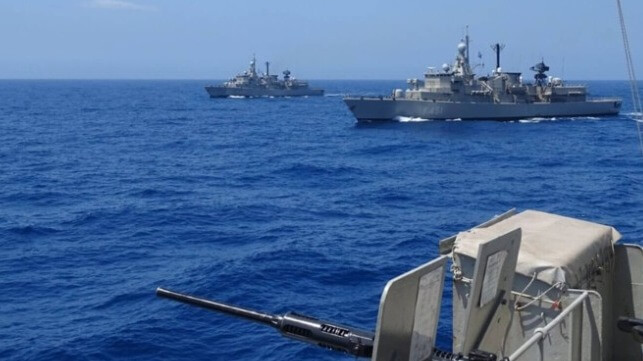Greece Takes Effective Action to Deter Russian Oil Transfers

Greece is extending a long-running series of naval drills in the Bay of Laconia, which have successfully forced tankers that previously used the area for ship-to-ship transfers to relocate elsewhere.
After the implementation of G7 price cap on Russian oil, the bay became a hotspot for Russian crude transfers, some compliant with the rules and some less than above-board. STS transfers are commonplace in the industry, but they are also one of the main methods used to disguise the origins of an oil cargo for purposes of sanctions evasion. Russian shipping interests found the Bay of Laconia to be a suitable spot because it is sheltered, located in international waters, and geographically convenient for "shadow fleet" tankers coming from Black Sea loading ports.
When Greece began holding declared naval drills in the same area in early May, it effectively forced this activity to move to other destinations, with a perfect success rate. According to Bloomberg, STS transfers have become more concentrated in areas off Egypt, Malta and West Africa, reflecting amped-up coastal state scrutiny.
Greece's drills have been extended through mid-September, the longest increase in duration announced yet.
White House declines to sanction "shadow fleet" tankers
Since 2022, the Biden administration has chosen to balance the goal of restricting Russia's oil revenue with the goal of maintaining the flow of Russian oil to the global market, hoping to pump the brakes on Russia's military finances while keeping energy prices at an acceptable level for the Western consumer. The U.S. Treasury's "price cap" proposal for Russian oil shipping was designed to keep this balance: the $60 per barrel cap was intended to limit Russian oil revenue at the margins while leaving the tap open, allowing Russian crude exporters to use Western ships and vendors if they complied with the cap, or switch to non-Western shipping if they wished to sell at full market price.
Russian interests responded first by evading enforcement, then by de-linking the Russia-serving tanker fleet from the G7 - creating a "shadow fleet" of dirty tankers that are flagged and owned in obscure jurisdictions. Since "shadow fleet" shipments are conducted with tankers and insurers based outside of the G7 nations, the activity is compliant with the cap's exception for non-G7 transactions. For coastal states (like Greece), there is a new price in the form of risk: these tankers are older than the global average, and operate in a lightly-regulated, questionably-insured twilight zone.
According to the New York Times, some officials at the Treasury now realize that in order to make the G7 price cap work, it will be necessary to force Russia to use G7 tankers and shipping services again - by sanctioning the Russian shadow fleet out of existence. Treasury has already begun this process with about 20 Russia-linked tankers, forcing the affected vessels to idle at anchor; so far, this has not caused a spike in the price of oil.
There are about 100 more vessels on Treasury's priority list left to go, and the department believes that if they were all sanctioned out of operation, Russia would return to using G7-based tankers - and would therefore have to sell its oil for the G7-approved price of $60. The oil would still get shipped to buyers, global supply levels would stay the same, global oil prices would remain unchanged, and Russia would earn slightly less for its energy sales, this argument goes.

that matters most
Get the latest maritime news delivered to your inbox daily.
But the White House is uninterested in green-lighting more tanker sanctions because of the perceived risk that it could raise global oil prices - specifically because 2024 is an election year, and gas prices are key to voter sentiment, officials told the Times.
"Economic advisers inside the White House worry that would risk inflaming oil prices this summer and push up U.S. gasoline prices, which could hurt Mr. Biden’s re-election campaign," reported the Times.
